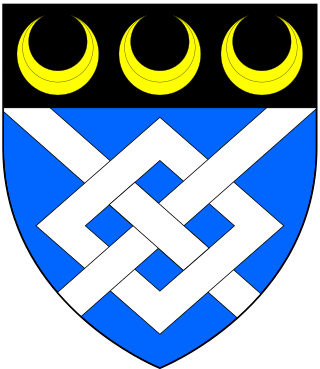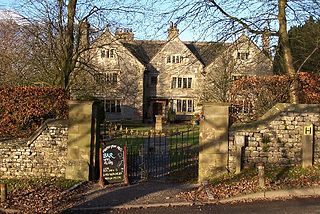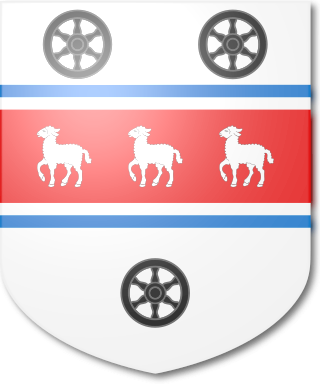
Duke of Devonshire is a title in the Peerage of England held by members of the Cavendish family. This branch of the Cavendish family has been one of the wealthiest British aristocratic families since the 16th century and has been rivalled in political influence perhaps only by the Marquesses of Salisbury and the Earls of Derby.

Baron Hazlerigg, of Noseley in the County of Leicester, is a title in the Peerage of the United Kingdom. It was created in 1945 for Sir Arthur Hazlerigg, 13th Baronet. He had previously served as Lord Lieutenant of Leicestershire. As of 2023 the title is held by his great-grandson, the fourth Baron, who succeeded his father in 2022.
Four Oaks is an affluent residential area in Sutton Coldfield, West Midlands, lying along the north and east borders of Sutton Park. Four Oaks is situated approximately 7+1⁄2 miles (12.1 km) north of Birmingham City Centre, and is bordered by Sutton Park, Streetly, Mere Green, Little Aston, Roughley and Aldridge. Four Oaks has a population of 21,690 as of 2004, and is part of the Sutton Four Oaks electoral ward.

There have been three baronetcies created for people with the surname Hood, one in the Baronetage of Great Britain and two in the Baronetage of the United Kingdom. The first Baronet of the first creation was made Viscount Hood, while the fourth Baronet of the second creation was made Baron St Audries.

Alexander Fuller-Acland-Hood, 1st Baron St Audries PC, known as Sir Alexander Fuller-Acland-Hood, Bt, until 1911, was a British Conservative Party politician. He served as Parliamentary Secretary to the Treasury under Arthur Balfour from 1902 to 1905.
There have been seven baronetcies created for persons with the surname Palmer, two in the Baronetage of England, one each in the Baronetages of Ireland and of Great Britain and three in the Baronetage of the United Kingdom. As of 2021, four of the creations were extant.
There have been four baronetcies created for persons with the surname Montgomery, one in the Baronetage of Nova Scotia, one in the Baronetage of Great Britain and two in the Baronetage of the United Kingdom. One creation is extant as of 2023.

There have been four baronetcies created for persons with the surname Rose, all in the Baronetage of the United Kingdom. Three of the creations are extant as of 2010.
There have been eleven baronetcies created for persons with the surname Robinson, four in the Baronetage of England, one in the Baronetage of Great Britain and six in the Baronetage of the United Kingdom. As of 2008 two of the creations were extant, while one was dormant.
There have been four baronetcies created for persons with the surname Hall, one in the Baronetage of Nova Scotia and three in the Baronetage of the United Kingdom. Three of the creations are extant as of 2010.
There have been three baronetcies created for members of the Mosley family, one in the Baronetage of England and two in the Baronetage of Great Britain. Only one creation is extant. Since 1980, the title has been held jointly with Baron Ravensdale in the Peerage of the United Kingdom.

William Bateman Bateman-Hanbury, 2nd Baron Bateman, styled The Honourable from 1837 until 1845, was a British peer and Conservative politician.
Sir Edward Dolman Scott, 2nd Baronet was an English landowner and a Whig politician.

Sir Francis Edward Scott, 3rd Baronet was an English landowner.

General Sir Edward Kerrison, 1st Baronet, was a British Army officer and politician.


The Scott Baronetcy, of Great Barr in the County of Stafford, was created in the Baronetage of the United Kingdom on 30 April 1806 for Joseph Scott of Great Barr Hall, Member of Parliament for Worcester.
Robert Bateman was an English merchant and politician who sat in the House of Commons between 1614 and 1626.

The Bateman baronetcy, of How Hall in the County of Norfolk, was created in the Baronetage of England on 31 August 1664 for Thomas Bateman, a London merchant. He was a son of Richard Bateman, a younger son of Richard Bateman of Hartington. He had served as High Sheriff of Cambridgeshire and Huntingdonshire in 1657 and 1658, and Alderman for the London ward of Walbrook from 17 April 1662 until 1664. He had no children, and on his death on 13 October 1685 the baronetcy became extinct.

The Bateman baronetcy, of Hartington in the County of Derby, was created in the Baronetage of the United Kingdom on 13 December 1806 for Hugh Bateman. The Batemans of Hartington Hall were the senior branch of the family; Sir Hugh had no sons, so the baronetcy was created with a special remainder allowing the male heirs of his two daughters to succeed. On 14 February 1815 his elder daughter Catherine Juliana married Edward Scott, and on 3 August the same year his younger daughter Amelia Anne married Sir Alexander Hood, 2nd Baronet, of St Audries.